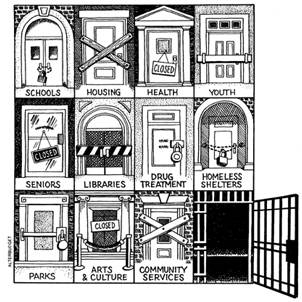 For countless ex-offenders, prison doors have been a revolving door. They are released from prison and in a period of time they are back. Before heading out of prison some don’t know what to expect of the outside world. Hakim Cunnigham gave witness to what he felt prior to being released from jail in an article by the Dig Boston. Cunnigham felt the difficulties of returning back into society. Other places in the United States and around the world are trying to reduce the rates of ex-offenders going back to prison. Lois Davis from the LA Times states that “each year more than 700,000 people are released from American prisons, but within three years of their release, four out of ten of them end up back behind bars, guilty of committing new crimes or violating the terms of their release”. Davis also feels that in order to reduce recidivism rates education and job training is necessary. A study that Davis and his colleagues conducted “found that inmates who participated in correctional education programs — remedial education to develop reading and math skills, GED preparation, postsecondary education or vocational training — were 43% less likely to return to prison within three years of release in comparison to those who did not participate”. Supporting inmates by providing education and job training can help to stop prisons “revolving door”.
For countless ex-offenders, prison doors have been a revolving door. They are released from prison and in a period of time they are back. Before heading out of prison some don’t know what to expect of the outside world. Hakim Cunnigham gave witness to what he felt prior to being released from jail in an article by the Dig Boston. Cunnigham felt the difficulties of returning back into society. Other places in the United States and around the world are trying to reduce the rates of ex-offenders going back to prison. Lois Davis from the LA Times states that “each year more than 700,000 people are released from American prisons, but within three years of their release, four out of ten of them end up back behind bars, guilty of committing new crimes or violating the terms of their release”. Davis also feels that in order to reduce recidivism rates education and job training is necessary. A study that Davis and his colleagues conducted “found that inmates who participated in correctional education programs — remedial education to develop reading and math skills, GED preparation, postsecondary education or vocational training — were 43% less likely to return to prison within three years of release in comparison to those who did not participate”. Supporting inmates by providing education and job training can help to stop prisons “revolving door”.
Revolving Door
Annotated Citations Part 3
This week we took a look at how criminal records are perceived in the UK. Our refutations post used information from the Huffington post, the Guardian, Justice, philly.com, Washington and MSNBC. These sources below critically look at how help ex-criminals clear their record. There are two PDF articles that goes into depth on how cleaning out criminals records can help society in a whole. All of these articles go along with the theme of Giving Second Chance to ex-criminals and all of these articles are important to this recent blog post.
Wiping Records Clean
In the United Kingdom, new reforms are being passed to allow ex-offenders records to be wiped clean. There are many reasons why individuals feel that this new law should not pass. One of the reasons why people are against it is because although it can help ex convicts get a job and and reduce redivism, there should be some insurance placed to protect public safety. According to the Huffington post Justice Secretary Kenneth Clarke is trying to reduce the length of time in which ex convicts are obliged to disclose their previous offenses, depending on the sentencing time it can be wiped clean or not when applying for jobs. But Lord McNally, Minister of Justice in the United Kingdom disagrees. He argues that for public safety they should not we wiped clean. Employers have the right to know whom they are hiring, if it was a past child sex offender or not. He argues that other ministers, including himself, understand that minor convictions to juvenile offenders should not affect their entire future, but in other cases the records should not be deleted. David Green of Civitas also supports this argument, by discussing stating how important it is to know if the ex-offender had a minor or serious offense. This matters to employers and could make a difference in being doubtful of their history. He says, “By spending convictions rapidly you are deceiving people. These days no one gets put in prison unless they have done something pretty bad. I think this is sending the wrong message.” Another reason people might diasgree with passing the law it becaue they believe that with every right comes a responsibility, and major ex offenders did not oblige to the law therefore why would they have the benefit of being responsible for the consequences. Employers have the lawful right to know who they are hiring, whether an ex offender or not. However, recidivism is still an issue. Wiping their records clean can help ex-offenders return back to society and help society in the long run. Many ex-offenders cannot move on or advance in their lives because of their record. The discrimination they experience can push them back into criminal behavior. Wiping their records clean can thwart them from going back.
Criminal Record for Life?
“Recent increases in U.S. correctional populations have stirred both academic and public interest in the emergence and growth of “America’s criminal class” (Cose 2000, 48; Pettit and Western 2004; Sutton 2004). Yet in spite of rising awareness of criminal justice expansion, we lack precise information about the number of convicted felons and former felons in society. Furthermore, few attempts have been made to theorize how former felons fit into, and reshape, American democracy. To what extent do former felons share similar life chances? Does a criminal conviction represent a temporary or a permanent blot on their records? How does the growth of citizenship, democracy, and the civic reintegration of apply to criminal offenders ?
What if you did something that would be held against you for years or decades? How would you overcome that issue? These are the questions that ex-criminals ask themselves and others every day when they are trying to make a better life for themselves. As in the case of Wayne Jacobs and Steve Blackum who were featured in Philly.com’s article. They both grew up together in the 1960s. “Blackburn fought a man who owed him drug money in 1975. As the man ran away, one of Blackburn’s friends shot him dead. Blackburn was sentenced to life without parole. He was pardoned by Gov. Bob Casey in 1991, after serving 16 years as a model prisoner. He’s been a model citizen ever since. Jacobs spent 30 years in and out of prison for stealing to support his drug addiction. He’s been clean, sober and law-abiding since his 1997 release.” Both men struggling trying to make a new life for themselves after serving jail time. It was not until they created their own business, which gave them a second chance at life and a clean record. All criminals across the United States should be given the opportunity to clear their record after a certain amount of time. Although this means that “some serious sex and violent offenders could get jobs with the public without having to declare their past or a burglar could work as a plumber or gardener just a year after being punished and not mention anything about their previous criminal behavior.” It is a risk everyone will have to take, but the problem does not lie in taking the risk. The problem lays in not giving ex-criminals an opportunity. From our previous blogs one can tell that helping and giving ex-criminals better opportunites to succeed will reduce the amount of repeat offenders. Giving all criminals a clean record after a certain amount of time depending on their crime will give them as much opportunity as any other human being.
Ban the box has become a serious issue for ex-criminals. According to an article from MSNBC, “The Ban the Box supporters stress that employers are under no obligation to hire such candidates and can still conduct background checks and make the usual inquiries, just later in the hiring process”. States such as Rhode Island, Hawaii, California, Texas, New Mexico, Colorado, Maryland, Massachusetts and Washington have ban the “the ban the box” because they feel that every criminal should have an opportunity. The state of Washington even informs individuals on how to get their record cleared If the United States makes a set law stating that after a certain amount of time a criminal’s record could be wiped clean it could open the door towards their citizenship. They can vote and get a job equally and fairly. According to EX-OFFENDERS, American Civil Liberties union of Tennessee there are lot things ex-criminals cannot take part in. The purpose of limiting ex-criminals initially served to reduce crime that would lead to harm society. However, when ex-criminals are not allowed to have their record wiped clean this can a cause agreater harm to society because then they are reduced to go back to what they were doing before they were arrested to survive.
Ex-Criminals Still are Having Problems
Chicago Tribune Reports, a man’s recently was released from prison. The problem was he did not commit the crime which he was convicted of. He would have been in jail until 2043, but evidence proved his conviction wrong. Even after his sentence was overturned he has had problems finding employment.
Defy Ventures
Today we want to feature a non-profit organization who is in full support of helping ex-offenders by providing entrepreneurship, leadership, and career opportunities to people who have criminal histories. Defy Ventures is located in New York and was founded by Catherine Rohr. Please read the impressive story about what led her to start this organization. You can help this organzation by donating and spreading the word!
Annotated Citations Part 2
In any information that we present on our blog, we want to point you to the sources that we have used. We wouldn’t want to give any misleading information. As an informed reader, we want you to join us in finding other content or material that can help add qualified information to this topic we feel strongly about. The more information we recieve we can help others. We invite you to check out the sources we have looked at.
The story of Tracy L. Fisher was released in an article on Philly.com.

The website provides local news and weather that pertains to Philadelphia, PA. They also have information on sports, entertainment, business, food, lifestyle, and health.
The Crime Report is a journalistic organization focused on criminal justice.Their library contains news, articles ,and reports. They not only cover what is happening in the United States but also they include issues abroad. The Crime Report is a member of the Investigative News Network. This source has contributed to our blog by providing relevant statistics. Their article on “How Many MI Prisoners are Turning their Lives Around” gives an insight into lives that are commited to changing their lives around.
![]()
Another article, Hiring Ex-Offenders: Time For a Different Approach, written by the Crime Report offers a viewpoint on how many programs are created to reduce redicivism but they are not proving effectiveness. This information is important to our blog because it shows that a different approach is needed to help ex-offenders.
The author William D. Murrell states “The lack of success with employment programs suggests to me that perhaps we are missing something crucial.”
Another source we used this week is Inc. com. Their targeted audience are entreprenuers. They give ideas and resources to help small businesses. Their interesting take on hiring ex-offenders offered a new perspective to employers. The article “Why You  Should Hire an Ex-Cons” gives employers several reasons they could benefit from employing ex-offenders. They highlight the life of Catherine Rohr who started an entreprenuership program for ex-convicts.
Should Hire an Ex-Cons” gives employers several reasons they could benefit from employing ex-offenders. They highlight the life of Catherine Rohr who started an entreprenuership program for ex-convicts.
The Skills Honed in Illicit Trades, and Put to Better Use written by the New
 York Times gives an example of a non-profit organization that works with people with criminal backgrounds to give them training and mentor them to be entreprenuers.
York Times gives an example of a non-profit organization that works with people with criminal backgrounds to give them training and mentor them to be entreprenuers.
Stepping Stones to Transformation
One of the ways that prisoners can transform their lives is by obtaining a job placement. It is one of the small stepping stones that can help them re-enter into society. As in the case of Tracey L. Fisher who grew up in West Philadelphia.  The youngest of four, Fisher did not attend school nor finish his education. This led him down a wrongful path full of mistakes. He began to sell drugs in his community. At 21 he got arrested for aggravated assault, armed robbery and drug possession. When the article was written he was 44, and had been in prison since he first got arrested. Tracey Fisher now has become, according to his fellow inmates, a spiritual guide and a life coach to dozens of prisoners at the Federal Correctional Facility, in Burlington County, New Jersey. He is the only prisoner at the facility that is able to talk to other inmates during the orientation process. Fisher even teaches a weekly “standing-room-only” workshop focused on getting rid of the wrongful mentality, that Fisher calls “stinkin’ thinkin’. Tracey Fisher was released in 2012, and continued his out reach work for prisoners even out of jail. He mentioned that he was not always a model prisoner. In the beginning, he was aggressive and ignorant until he realized what he had become. His life story is considered a testament that prisoners can turn their lives around and reinstitute themselves into society. Fisher is one of the many examples of prisoners that have decided to change their lives for the better and have become positive influences for their communities. Offenders that have changed their lives, like Fisher did, are good for our nation because they serve as a role model for others to change and improve their lives.
The youngest of four, Fisher did not attend school nor finish his education. This led him down a wrongful path full of mistakes. He began to sell drugs in his community. At 21 he got arrested for aggravated assault, armed robbery and drug possession. When the article was written he was 44, and had been in prison since he first got arrested. Tracey Fisher now has become, according to his fellow inmates, a spiritual guide and a life coach to dozens of prisoners at the Federal Correctional Facility, in Burlington County, New Jersey. He is the only prisoner at the facility that is able to talk to other inmates during the orientation process. Fisher even teaches a weekly “standing-room-only” workshop focused on getting rid of the wrongful mentality, that Fisher calls “stinkin’ thinkin’. Tracey Fisher was released in 2012, and continued his out reach work for prisoners even out of jail. He mentioned that he was not always a model prisoner. In the beginning, he was aggressive and ignorant until he realized what he had become. His life story is considered a testament that prisoners can turn their lives around and reinstitute themselves into society. Fisher is one of the many examples of prisoners that have decided to change their lives for the better and have become positive influences for their communities. Offenders that have changed their lives, like Fisher did, are good for our nation because they serve as a role model for others to change and improve their lives.
In 2009, The Crime Report did an article on how Michigan prisoners out on parole were changing their lives. The article was based on the Michigan Prisoner Re-Entry Initiative. In 2009, out of 318 prisoners that were let out on parole only 29 did not succeed and had to go back into custody. 287 of those prisoners have successfully integrated themselves into society finding work and going back to school. Programs like this serve positively to our nation because it gives prisoners a second chance to put their lives together.
Getting legitimate employment is one of the highest priorities for offenders. Providing employment to ex-convicts is good for our nation because it reduces recidivism, which is the action of ex-convicts repeating their offenses. Therefore, the community fights against crime through employment. According to the Michigan state government, the Michigan Prisoner Reentry Program has reduced recidivism from a 45.7% in 1998 to a 31.5% in 2008. These types of programs help lead inmates to better employment. 
By giving employment opportunities to former law offenders, you give life-changing opportunities to people that just want to earn an honest income. 95% of ex-convicts that are rearrested, they are unemployed. The Department of Labor supports and encourages employers by giving them tax breaks. The Work Opportunity Tax Credit Program provides employers with tax credits up to $2,400 per employer each year.
Employers’ Reasons for Not Hiring Ex Offenders
Employers, what will it take to get you to hire ex-offenders?
The federal agency that supervises offenders on probation and parole in Washington, DC isn’t going to tiptoe around this question anymore. Instead, at a time when a bad economy has made finding a job with a record even more difficult, officials at the Court Services and Offender Supervision Agency have started flat-out asking employers whether they’d consider bringing a former offender on board, and if not what might be done to change their mind.
with a record even more difficult, officials at the Court Services and Offender Supervision Agency have started flat-out asking employers whether they’d consider bringing a former offender on board, and if not what might be done to change their mind.
It’s all part of a new media campaign designed to bring awareness to the fact that not everyone with a criminal record is the same. On any given day, the CSOSA’s Community Supervision Program is actively responsible for more than 16,000 offenders, many of whom are alcohol and drug-free, skilled, employment- ready and have put their past behaviors well behind them, says Leonard Sipes, the agency’s senior public affairs specialist. Yet, only about 53 percent of those individuals are currently working — a statistic CSOSA aims to improve by confronting the issue head on.
is the same. On any given day, the CSOSA’s Community Supervision Program is actively responsible for more than 16,000 offenders, many of whom are alcohol and drug-free, skilled, employment- ready and have put their past behaviors well behind them, says Leonard Sipes, the agency’s senior public affairs specialist. Yet, only about 53 percent of those individuals are currently working — a statistic CSOSA aims to improve by confronting the issue head on.
“ There’s a certain point where you’re not going to make an omelet unless you scramble some eggs,” Snipes said. “So we decided to take a risk. What do we have to lose by trying and giving businesses a voice? Sure, some will be harsh and negative, some will stereotype – but if we don’t engage in this conversation things will stay the same. Hopefully by doing this we’ll open the doors for one person to get hired and then maybe for two more the next time and build from there.”
The CSOSA will run video and radio interviews with employers on its website and YouTube. While some employers have been encouraging, many have told Sipes that they simply don’t want to hire ex-offenders because they’re worried about having to deal with trouble. “They want ironclad guarantees that the person will show up and do the job without creating problems,” he says.
without creating problems,” he says.












